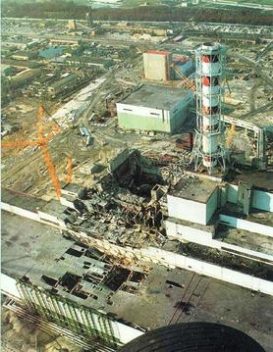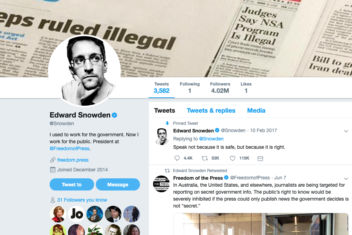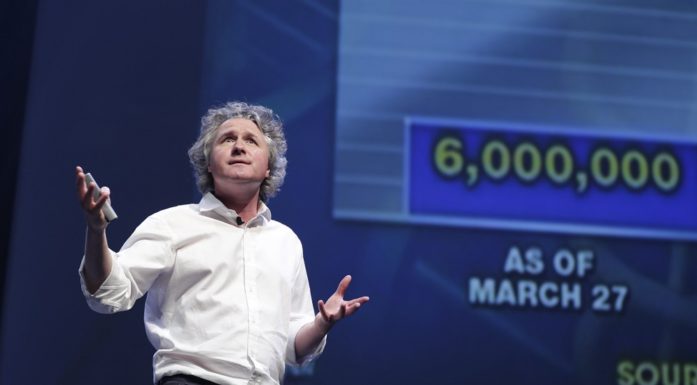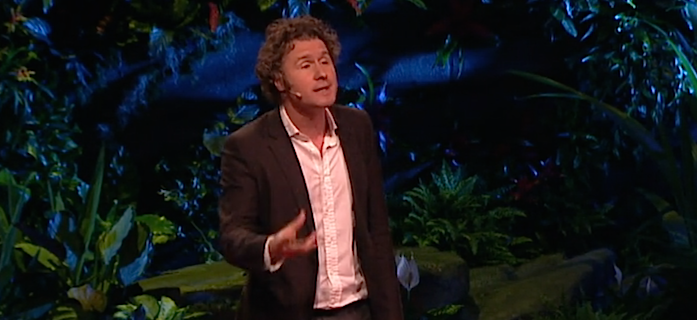A whistleblower’s tale
The American whistleblower Edward Snowden paints a frightening vision of the world we live in, where abuses of power extend far beyond the reaches of law and affect us all.
Edward Snowden may have spent the last six years in exile in Moscow, Russia, but that hasn’t stopped him from watching the new HBO mini-series Chernobyl — and it clearly has him thinking.
The series documents the cascade of events — and lies— that led to the April 1986 explosion and meltdown of a nuclear reactor in Chernobyl, Ukraine.
In a video-linked talk from Moscow entitled “Revealing truth in politics” that was live broadcast at The Big Challenge Science Festival in Trondheim, Snowden talked about how important it was to tell the truth — and how that was underscored by the HBO series.
When festival host Siri Lill Mannes asked Snowden if “telling the truth was always right,” given the personal price he himself paid for releasing thousands of US National Security Agency documents in 2013, he invoked the Chernobyl accident and the miniseries in his reply.

Chernobyl Reactors No. 4 and No. 3 shortly after a nuclear explosion and meltdown in Reactor 4. Years after the accident, it came clear that lies about the fatal flaws in the reactor’s design were the real reason behind the disaster. Photo: Soviet Authorities, used under US Fair Use copyright laws.
Choosing to tell the truth “is not about right and wrong, it’s about how you want to live, and the world you want to live in, and what happens if you don’t tell the truth,” he said. “Chernobyl asks, ‘What is the cost of lies?’ …. It’s not enough to believe in something, you have to stand for something.”
A Pulitzer prize for some, exile for Snowden
The documents Snowden released were published by The Guardian, The New York Times, Der Spiegel, The Washington Post, Le Monde and many other media outlets across the globe. The reporting on the NSA sparked by the documents led The Guardian and The Washington Post to win the 2014 Pulitzer Prize for Public Service, the highest journalism award in the United States.
Things didn’t go quite as well for Snowden. As a result of the document release, he was charged with violations of the US Espionage Act and with theft of government property. His passport was revoked, stranding him in Russia where he now has temporary asylum. He has been both widely criticized and widely praised for his efforts to expose the NSA’s secret surveillance programmes.
Snowden told festival goers that he was willing to give up his life in the US because he felt compelled to expose the NSA’s secret programmes and more than that, to expose how the US government had gone far beyond the bounds of the law under the guise of protecting people from terrorism.
“The story of 2013 wasn’t about surveillance; mass surveillance was merely the underlying symptom of a larger disease,” he said. “The US government had gone beyond what the law permitted, beyond basic human rights… it wasn’t about safety — it was about power.”
Technology advancing beyond law
Snowden decried the ability of different institutions and technologies to track our every move, whether via our use of apps on smartphones or via more direct monitoring.
“Governments in the previous world had to spend huge sums to track individuals, they needed teams of people to track just one person,” he said. “Today that dynamic is completely reversed, one person sitting behind their monitor can track with precision unimaginable numbers of people.”
This, Snowden said, is “not science fiction. It’s now feasible for governments and companies to track records of our private lives.”
Ironically, he said, the internet, which allows us to connect beyond national borders, and which “builds bonds of fraternity and can erase colour, creed, languages and really tie us together… has been corrupted.”
Now, he says, all that information can be used as a system of social control.
“We are in the midst of the greatest redistribution of power,” he said, in part because of the ability of social media networks to be manipulated to interfere with elections.
A far greater threat, however, is that Facebook and other social media systems have been transformed into “profit centres where they are selling access to human minds by way of your eyeballs. They are using screens to capture attention and to attempt to change behaviour…. It’s a massive system of manipulation.”
Snowden also pointed out that the ability to collect all this information has advanced far faster than the ability of lawmakers to regulate it.
“Sometimes what IS legal is the scandal,” he said. “It’s not that they broke the law, but that they didn’t have to break the law.”
A critic in Russia
Host Siri Lill Mannes asked Snowden what kind of watchdog role he was able to play in Russia under the regime of Vladimir Putin. Snowden replied that he had been free to criticize the Russian government.
He cited his position as the president of the Freedom of the Press Foundation and his Twitter account as two examples of where he was able to continue to call attention to efforts by governments worldwide to block the truth.
“We don’t want to live in a world where journalists have to act like spies,” he said. “We need to change the world so we don’t have to hide from our own governments.”





